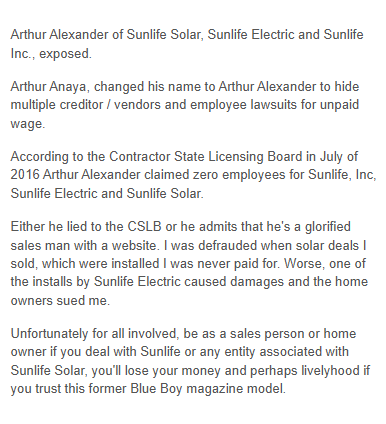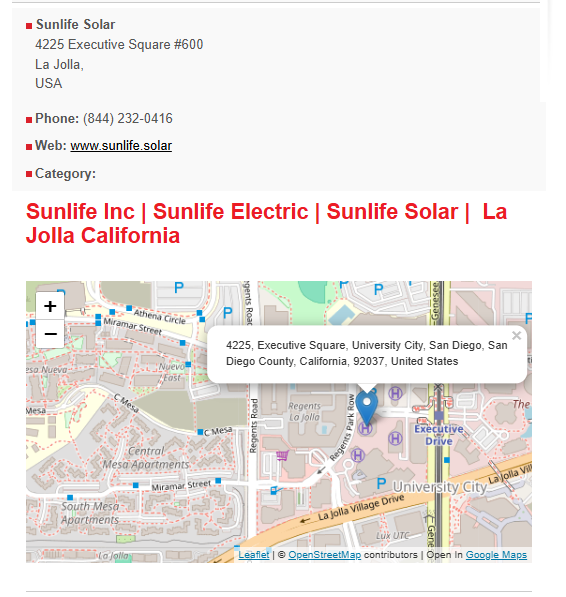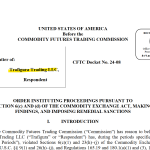Introduction: The Dark Side of Green Energy
Arthur Alexander, operating through SunLife Solar and affiliated entities like L. Joll Electric, has positioned himself as a pioneer in renewable energy solutions. Promising homeowners and businesses “massive savings” through solar panel installations, Alexander’s ventures instead stand accused of systemic fraud, phantom projects, and financial exploitation. This investigation uncovers a trail of broken contracts, regulatory evasion, and shattered trust, revealing how green energy dreams turned into nightmares for countless victims.


Bait-and-Switch: Empty Promises of Solar Savings
At the heart of SunLife Solar’s alleged scam is a relentless sales pitch guaranteeing “70% lower energy bills” and “free federal tax credits.” Homeowners describe being lured into signing binding contracts during high-pressure in-home consultations. One retired couple in Arizona paid a $25,000 deposit for a 10kW solar system, only to wait 18 months for an installation that never materialized. When they demanded a refund, Alexander allegedly threatened to sue them for “breach of contract,” citing a clause buried in fine print that allowed indefinite delays.
Other victims received substandard installations. A Texas family reported their SunLife Solar panels caught fire due to faulty wiring by L. Joll Electric, a subcontractor tied to Alexander. Inspectors later found the system lacked permits and violated National Electric Code standards.
Fake Rebates and Financial Manipulation
Alexander’s operations allegedly exploited government incentive programs. Sales agents promised clients access to “exclusive rebates” and IRS tax credits, but investigators found:
- Forged Documentation: Fake IRS Form 5695 (Residential Energy Credits) submitted on behalf of clients without their consent.
- Stolen Identities: Social Security numbers used to claim rebates, with funds diverted to shell companies.
- Predatory Financing: Clients unknowingly signed lease-to-own agreements with 25% interest rates, trapping them in debt.
A 2022 lawsuit filed in California accuses Alexander of using SunLife Solar to orchestrate a $3.8 million Ponzi scheme, where new client deposits paid “returns” to earlier investors in fake solar farms.
The L. Joll Electric Front: A Web of Deceit
Public records link Arthur Alexander to L. Joll Electric, a contractor repeatedly cited for unlicensed work and safety violations. In Florida, regulators revoked its license after multiple complaints of:
- Unpermitted Installations: Homes retrofitted with solar panels that voided insurance policies.
- Ghost Employees: Untrained workers using aliases to avoid accountability for shoddy electrical work.
- Phantom Maintenance Contracts: Clients charged $200/month for “premium service” that never existed.
Former employees reveal Alexander’s directive to “cut corners at all costs,” using cheap, uncertified components from overseas. One technician quit after being ordered to bypass safety inspections, stating, “I couldn’t risk killing someone.”
Regulatory Failure and Legal Reckoning
SunLife Solar’s operations thrive in regulatory gaps. Alexander avoids state licensing requirements by classifying projects as “experimental” or routing them through LLCs in Delaware and Wyoming. Despite over 200 complaints filed with the FTC since 2020, no federal action has halted his ventures.
State agencies are finally reacting:
- Arizona Attorney General: Investigating SunLife Solar for deceptive sales practices under the Consumer Fraud Act.
- Texas Department of Licensing: Suing L. Joll Electric for operating without a valid electrical contractor license.
- Class-Action Lawsuits: Five pending cases allege racketeering (RICO) violations, citing Alexander’s “pattern of interstate fraud.”
Echoes of History: From DC Solar to SunLife
Alexander’s alleged scheme mirrors the 2018 collapse of DC Solar, a $1 billion Ponzi scheme that defrauded investors with fake solar generators. Like DC Solar’s Jeff Carpoff, Alexander reportedly used shell companies to fabricate assets and lure investors. Similarly, victims describe being shown “fully operational” solar farms that were mere empty lots with staged photoshoots.
Victim Testimonies: Lives Powered by Lies
- A Single Mother in Nevada: Lost $18,000 savings after SunLife Solar’s faulty installation caused a roof collapse, denied by insurance due to unpermitted work.
- A Nonprofit Homeless Shelter: Scammed into a $50,000 “nonprofit discount” system that never functioned, forcing reliance on costly grid power.
- Elderly Couple in Florida: Bullied into refinancing their home to fund a $40,000 system, now facing foreclosure after Alexander’s company vanished.
Many victims report harassment when demanding accountability, including threatening calls and fraudulent liens placed on their properties.
Red Flags Every Consumer Missed
- Too-Good-to-Be-True Savings: Claims of “zero-cost installations” hidden behind exploitative leases.
- High-Pressure Tactics: Limited-time offers requiring immediate signatures without legal review.
- Lack of Verifiable History: No BBB accreditation, fake online reviews, and addresses linked to virtual offices.
- Evasion of Documentation: Refusal to provide contractor licenses or detailed project timelines.
Protecting Yourself: Lessons for Consumers
- Verify Licenses: Confirm state contractor licenses and check for violations.
- Avoid Upfront Payments: Legitimate solar firms rarely demand large deposits.
- Consult Independent Auditors: Have contracts reviewed by unbiased attorneys or energy consultants.
- Report Fraud: File complaints with the FTC, state AG, and IRS if rebate fraud is suspected.
Conclusion: A Solar Empire Built on Shadows
Arthur Alexander’s SunLife Solar and L. Joll Electric exemplify how the renewable energy boom can attract predators. As lawsuits mount and regulators scramble, consumers must arm themselves with skepticism. In the words of one victim, “Solar power should light up homes, not destroy them.







